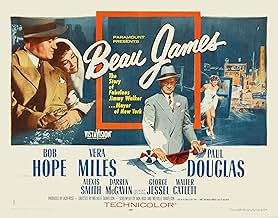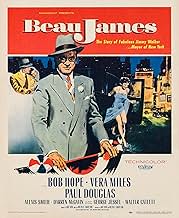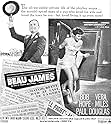Biopic of the political career of Jimmy Walker, flamboyant and somewhat corrupt Mayor of New York City from 1926-1932.Biopic of the political career of Jimmy Walker, flamboyant and somewhat corrupt Mayor of New York City from 1926-1932.Biopic of the political career of Jimmy Walker, flamboyant and somewhat corrupt Mayor of New York City from 1926-1932.
Eric Alden
- Reporter
- (uncredited)
Babette Bain
- Puerto Rican Child
- (uncredited)
Russ Bender
- Reporter
- (uncredited)
Jack Benny
- Jack Benny
- (uncredited)
John Benson
- Photographer
- (uncredited)
- Director
- Writers
- All cast & crew
- Production, box office & more at IMDbPro
Storyline
Did you know
- GoofsMayor Walker is in a parade near movie's end. In the background is a 1955 or 1956 Cadillac.
- Quotes
Mayor James J. 'Jimmy' Walker: Goodbye... but remember this: the voters always get what they deserve. I wasn't the only chump in this city. It took a lot of you to elect me.
- ConnectionsFollows Yankee Doodle Dandy (1942)
Featured review
A recent biography of Hope on Channel 13 mentioned that his perennial joke at the Oscars about not getting the Oscar) was actually based on the truth. After 1944, when his close friend and partner Bing Crosby won the Oscar for GOING MY WAY, Hope was bothered by his inability to get nominated. One of his writers explained the problem: Hope could not read a straight speech in a script without fearing he was losing his audience. He had to always have a good one liner to leave 'em laughing. Unfortunately, this type of script doctoring prevented him from giving the type of performance that would have merited an Oscar.
Yet in the middle years of the 1950s Hope came close to achieving a balance of comic and dramatic possibilities. In three films (two biographies and one comedy) he played central figures with actual problems. They were THE SEVEN LITTLE FOYS, THAT CERTAIN FEELING, and BEAU JAMES. All three films are his best films. THAT CERTAIN FEELING deals with a man with major psychological problems competing with a superior,successful man (George Sanders) for the woman they love (Eva Marie Saint). THE SEVEN LITTLE FOYS gives a history Eddie Foy Sr.'s marriage to an Italian lady, and their children, and how (when his wife died) his sister-in-law tried to have the children taken from him. And BEAU JAMES (based on a biased, but well written biography by Gene Fowler)is about the Mayor of New York City from 1926 - 1932, James J. Walker.
Walker was a very popular mayor in the 1920s, re-elected by a majority (over Fiorello LaGuardia) of half a million votes (a considerable achievement then). But his administration was corrupt, and he was abandoning his wife for his girlfriend, Broadway actress Betty Compton. Judge Samuel Seabury tore the Walker administration apart in a series of hearings from 1930 to 1932. They culminated with Governor Franklin Roosevelt holding hearings involving Walker in Albany that showed he accepted "gifts" from people doing business in the city. Walker could not really explain away this behavior and he resigned. The handling of the scandal by Roosevelt assisted him in getting the Democratic nomination for the Presidency in 1932.
Hope does very well as Walker. He does have a serious role where his flippant jokes match the character. He also shows the right degree of serious behavior, panicked when Betty is spirited away by Paul Douglas and Tammany Hall, or when he tells off the citizens of New York at Yankee Stadium for electing him. But the gaps in the script - the unwillingness to show the uglier side of the corruption - prevent one from taking it too seriously. Hope deserves recognition for his performance here, but he didn't merit (nor receive) an Oscar nomination for BEAU JAMES.
This is a celluloid version of Gene Fowler's valentine to his old chum Jimmy. It tries to make a case that Walker did not realize his taking the bribes/gifts was wrong. Walker knew it was wrong, but he never admitted it - he had been brought up in a city run by the Hall, and he was doing business there exactly as every boodling Mayor of New York had done since the 19th Century. Walker (a good Catholic, presumably) also knew that he was committing adultery when he took up with Ms Compton. Later, after he left City Hall, he divorced his wife (playedwell by a coldly calculating Alexis Smith here) and married Betty. Interestingly that marriage eventually failed, although Jimmy and Betty did adopt a girl. Compton died in 1941. Jimmy in 1947.
Historians generally rank Walker among the worst Mayors of New York, and in the major cities of the U.S., in the twentieth century. However, recent scholarship has suggested that Walker was maligned. Nobody suggests that the corruption was not there, but it was to the interest of FDR and Judge Seabury (who had unrealistic political hopes of his own) to go after the Hall and Jimmy. Interestingly enough, Walker's old adversary Fiorello LaGuardia was more forgiving and pragmatic than FDR was. Walker went to Europe for a number of years with Betty (where did he have the money for this move - the film ignores this matter). When he returned (a Federal tax investigation decided there was nothing to go after), LaGuardia appointed Walker to be labor mediator in the garment industry. He did that job well. Also, some recent scholars seem to support what Darren McGavin's character says in the film. McGavin tells Hope that although he works only four hours a day he does more work each day than the last four mayors did working full days. The reason is that he's bright. There is evidence that he was remarkably adept at thinking out quick, to the point solutions on his feet.
As a Democrat, Walker had the constant problem of working under Republican federal administrations in Washington (Presidents Coolidge and Hoover). In his first term, Cunard and other oceanic lines announced plans for building bigger and faster steamships. This meant their current piers would be too short for them. Walker contacted the Department of Commerce (under Hoover during Coolidge's administration) for permission to extend the piers into the Hudson River. The problem was that this would interfere with transportation in interstate commerce on the Hudson (longer piers mean less room for boats sailing on the river). Coolidge and Hoover said no. When told this, Walker immediately asked if there was any problem of blasting into the granite bedrock of the island of Manhattan to extend the piers into the island. His engineers said it could be done. There was no further problem about the extension of piers. If Walker could think that clearly on such a problem he probably could do his job half-well. But his moral lapses can't be easily dismissed, as this film tries to do.
Yet in the middle years of the 1950s Hope came close to achieving a balance of comic and dramatic possibilities. In three films (two biographies and one comedy) he played central figures with actual problems. They were THE SEVEN LITTLE FOYS, THAT CERTAIN FEELING, and BEAU JAMES. All three films are his best films. THAT CERTAIN FEELING deals with a man with major psychological problems competing with a superior,successful man (George Sanders) for the woman they love (Eva Marie Saint). THE SEVEN LITTLE FOYS gives a history Eddie Foy Sr.'s marriage to an Italian lady, and their children, and how (when his wife died) his sister-in-law tried to have the children taken from him. And BEAU JAMES (based on a biased, but well written biography by Gene Fowler)is about the Mayor of New York City from 1926 - 1932, James J. Walker.
Walker was a very popular mayor in the 1920s, re-elected by a majority (over Fiorello LaGuardia) of half a million votes (a considerable achievement then). But his administration was corrupt, and he was abandoning his wife for his girlfriend, Broadway actress Betty Compton. Judge Samuel Seabury tore the Walker administration apart in a series of hearings from 1930 to 1932. They culminated with Governor Franklin Roosevelt holding hearings involving Walker in Albany that showed he accepted "gifts" from people doing business in the city. Walker could not really explain away this behavior and he resigned. The handling of the scandal by Roosevelt assisted him in getting the Democratic nomination for the Presidency in 1932.
Hope does very well as Walker. He does have a serious role where his flippant jokes match the character. He also shows the right degree of serious behavior, panicked when Betty is spirited away by Paul Douglas and Tammany Hall, or when he tells off the citizens of New York at Yankee Stadium for electing him. But the gaps in the script - the unwillingness to show the uglier side of the corruption - prevent one from taking it too seriously. Hope deserves recognition for his performance here, but he didn't merit (nor receive) an Oscar nomination for BEAU JAMES.
This is a celluloid version of Gene Fowler's valentine to his old chum Jimmy. It tries to make a case that Walker did not realize his taking the bribes/gifts was wrong. Walker knew it was wrong, but he never admitted it - he had been brought up in a city run by the Hall, and he was doing business there exactly as every boodling Mayor of New York had done since the 19th Century. Walker (a good Catholic, presumably) also knew that he was committing adultery when he took up with Ms Compton. Later, after he left City Hall, he divorced his wife (playedwell by a coldly calculating Alexis Smith here) and married Betty. Interestingly that marriage eventually failed, although Jimmy and Betty did adopt a girl. Compton died in 1941. Jimmy in 1947.
Historians generally rank Walker among the worst Mayors of New York, and in the major cities of the U.S., in the twentieth century. However, recent scholarship has suggested that Walker was maligned. Nobody suggests that the corruption was not there, but it was to the interest of FDR and Judge Seabury (who had unrealistic political hopes of his own) to go after the Hall and Jimmy. Interestingly enough, Walker's old adversary Fiorello LaGuardia was more forgiving and pragmatic than FDR was. Walker went to Europe for a number of years with Betty (where did he have the money for this move - the film ignores this matter). When he returned (a Federal tax investigation decided there was nothing to go after), LaGuardia appointed Walker to be labor mediator in the garment industry. He did that job well. Also, some recent scholars seem to support what Darren McGavin's character says in the film. McGavin tells Hope that although he works only four hours a day he does more work each day than the last four mayors did working full days. The reason is that he's bright. There is evidence that he was remarkably adept at thinking out quick, to the point solutions on his feet.
As a Democrat, Walker had the constant problem of working under Republican federal administrations in Washington (Presidents Coolidge and Hoover). In his first term, Cunard and other oceanic lines announced plans for building bigger and faster steamships. This meant their current piers would be too short for them. Walker contacted the Department of Commerce (under Hoover during Coolidge's administration) for permission to extend the piers into the Hudson River. The problem was that this would interfere with transportation in interstate commerce on the Hudson (longer piers mean less room for boats sailing on the river). Coolidge and Hoover said no. When told this, Walker immediately asked if there was any problem of blasting into the granite bedrock of the island of Manhattan to extend the piers into the island. His engineers said it could be done. There was no further problem about the extension of piers. If Walker could think that clearly on such a problem he probably could do his job half-well. But his moral lapses can't be easily dismissed, as this film tries to do.
- theowinthrop
- Jun 26, 2004
- Permalink
- How long is Beau James?Powered by Alexa
Details
- Release date
- Country of origin
- Languages
- Also known as
- Schöne Frauen, harte Dollars
- Filming locations
- Production companies
- See more company credits at IMDbPro
Box office
- Gross US & Canada
- $1,750,000
- Runtime1 hour 45 minutes
- Aspect ratio
- 1.85 : 1
Contribute to this page
Suggest an edit or add missing content






































